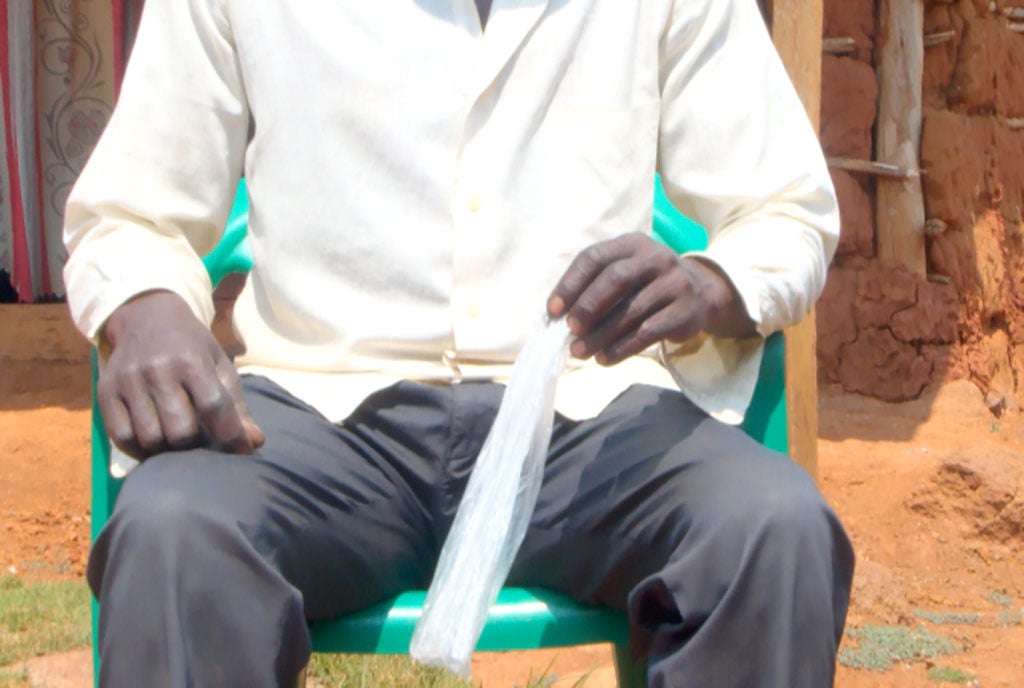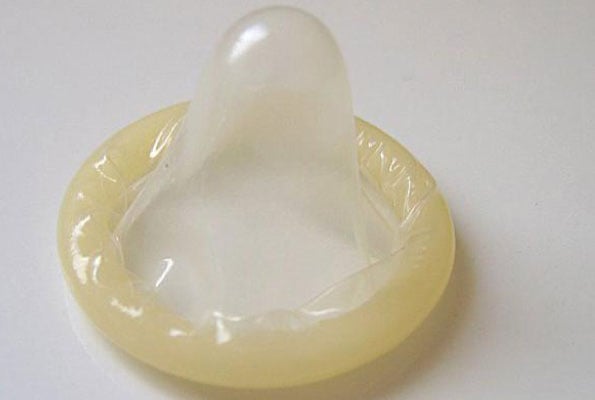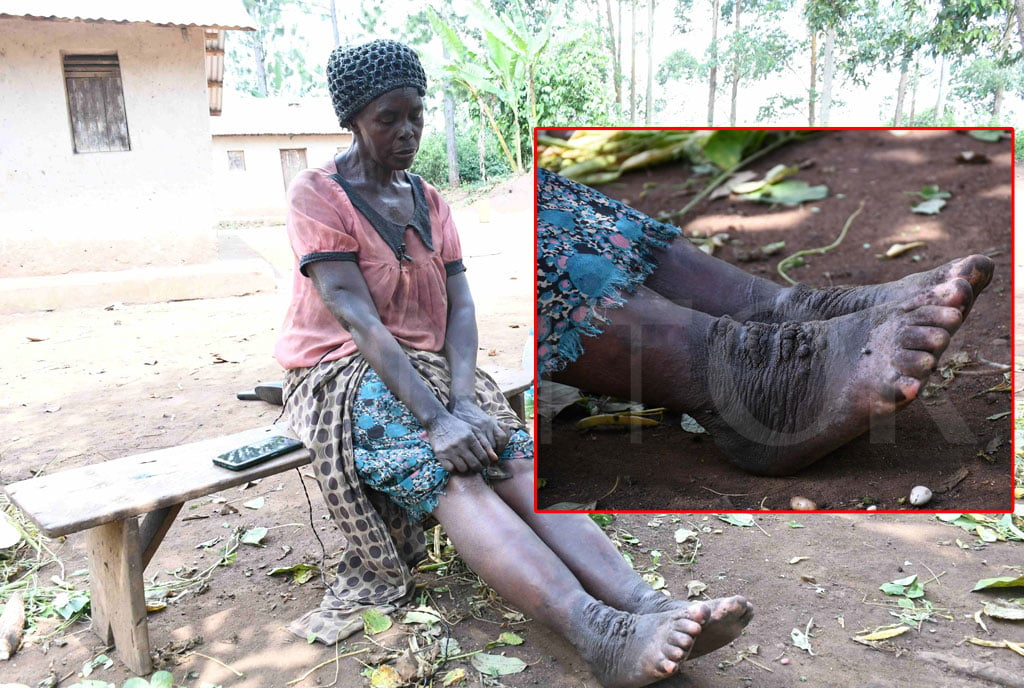
Men on the island say they carry polythene bags all the time, just like one would carry condoms. PHOTO/JESSICA SABANO
Under normal weather conditions, the boat ride from Kiyindi Landing Site to Mpuga Island in Bweema Sub-county, Buvuma District, takes 30 minutes. The island, one of the 52 islands in Buvuma, is four miles wide and has a population of about 150 people.
Getting off the boat, one is confronted with poor lodging facilities, shanty kiosks, fish stalls and shops. However, there is no drug shop or clinic in sight.
Statistics show that HIV prevalence in Buvuma stands at 236 cases, 132 of which are women while 104 are men. These figures are an improvement from 693 registered in 2023 and 806 registered in 2022, causing the residents of Mpuga Island to posit that it is by God’s grace that they are fighting HIV infection.
Moses Kivumbi has lived on Mpuga for more than 20 years and says district health officials can take up to six months or a year without visiting the island.
“We do not have condoms on this island. We use polythene bags (kaveera) to protect ourselves from HIV. You have to make sure the kaveera is clean and has no holes in it. Then, you tie it using a rubber band to secure it in place. You also have to avoid being too aggressive during sexual intercourse. Otherwise, the kaveera will tear and you will start regretting,” he emphasises.
A kaveera costs Shs100 in the shops but some people, such as Paulo Katoringa, cannot afford that amount.
“When I have an arrangement with a woman, I go to the shop to buy a mandazi (snack) for her. The mandazi is wrapped in a kaveera. After eating, that is the same kaveera we use when having sex. Depending on how we use it, sometimes it tears. Those who do not know how to use this method are dying of Aids,” he says.

A condom. PHOTO/FILE
Some men proved to this reporter that they carry polythene bags in their pockets all the time, just like one carries condoms.
“Some women over-emphasise the use of condoms and yet we cannot access them. The only way to make them comfortable is to pull the kaveera out of your pocket and show it to her. Everyone knows whoever has HIV on this island and many times, they do not even bother with protection,” one man says.
Transport costs vs HIV infection
We find Anna Nekesa, another resident, washing clothes at the lakeshore. A married woman, she admits that many couples do not even bother to use kaveera after failing to get a condom.
“These are people who have multiple sexual partners. There are a small number of women on this island so men share them, especially those who are not married. To avoid fights between the men, there is some kind of timetable. They book a woman in advance,” she says.
Mpuga Island is located between Kiyindi Landing Site and Namatale Island. However, the transport rates are such that the residents rarely leave the island. The daytime fare from Mpuga to Kiyindi is Shs150,000, while the daytime round-trip from Mpuga to Namatale costs Shs100,000.
“Someone cannot spend that much just to get condoms,” Nekesa laments, adding, “The men here are like bees. The only time they use kaveera as condoms is when a new woman has come to the island to visit or stay. Then, they line up, booking her for sex. There are no clinics here so we cannot test to know our HIV status. People live as though HIV/Aids does not exist.”
Nekesa adds that it took district health officials three years to remember the residents and supply them with mosquito nets.
“What confuses us is that when the district leaders are looking for votes, they manage to reach this island and promise to help us. Unfortunately, after winning the election, they do not return saying it is a hard-to-reach area,” she says.
Lack of health facilities
Geographical access to health facilities is difficult in some areas due to long distances and other natural factors, such as lakes, rivers, and marshes. To address this gap, the Ministry of Health established village health teams (VHT) in every community to act as the first contact between households and the health system.
Peter Kamya Tumusiime, the district councillor for Mpuga Island, says because the Island is geographically separated from Bweema Sub-county, most government projects go to Namatale Island.
“The government policy is that every parish should have a health centre II and a primary school, and we would love to advocate for Mpuga Island to get this infrastructure. However, it is far from the mainland. The VHTs are supposed to talk to residents about condom use, but how do you tell someone to use something they do not know how to use?” he asks.
Paul Ssempijja, the chairperson of Mpuga LC1 village, concurs, saying that VHTs rarely provide health services to the islanders.
“The team has only two members, who receive condoms during the outreaches conducted by Namatale Health Centre III but I am not sure if they distribute them to the population. VHTs are just volunteers, though. They also have to work for a living, so they rarely attend to their health duties. Only those who have prior business to conduct on other islands can buy condoms or access HIV testing services, he says.
Ssempijja adds that the lifestyle on the island is responsible for the new infections. “People fear only the water. Nothing else. They say if they can survive on the water, how can Aids kill them?”
A 2021 study, HIV epidemic in fishing communities in Uganda: A scoping review, published online in the National Library of Medicine, found that fishing communities do not have adequate knowledge of HIV/Aids in contrast to the general population.

Ms Polyne Nabwire from Family Medical Point giving out free condoms to fishermen at Kigungu landing site. HIV/AIDs prevalence is relatively higher on most landing sites in Uganda. PHOTO/EVE MUGANGA
This explains the pattern of risky sexual behaviour and the high incidence of HIV in fishing communities.
“From the qualitative research, low perception of HIV risk, a fatalistic attitude that HIV is unavoidable, the ‘life is short mentality” resulting from the dangerous nature of fishing loaded negatively on the perception of HIV risk. Occupational mobility, substance abuse, easily disposable income, and transactional sex activities were additional principal drivers of unprotected sex among residents of fishing communities,” the authors write.
Ssempijja adds that low HIV statistics do not match the reckless lifestyle of the fishermen. Instead, he attributes the low infections to the operations of the Marine Unit of the Uganda People’s Defense Forces (UPDF) on Lake Victoria to curb illegal fishing.
“The UPDF soldiers are a bit tough and many fishermen are fleeing the island because their incomes have dwindled. That means they are spreading Aids to the different islands and landing sites they settle on,” he says.
With no health centre on Mpuga Islands, residents who are ill take the boat ride to Namatale Health Centre III. Doreen Alupo, an enrolled midwife, insists that the HIV numbers are going down because there are many sensitisation campaigns.
“A few years ago, we were dealing with five new infections every month. But these days, we only get two cases or none. We carry out outreaches in the islands and the VHTs help in reaching out to the communities to distribute condoms.
Alupo adds that the health centre endeavours to test everyone who comes to the facility for treatment, especially expectant mothers.
“The testing enables women who are diagnosed with sexually transmitted diseases to receive proper treatment and prevent transmitting HIV to their babies,” she says.
Gaps in service delivery
However, not many women on Mpuga Island can access these services. Rose Akello, who is living with HIV, is four months pregnant but has not received any antenatal care.
“I need a thorough medical checkup to see how my pregnancy is developing. But I cannot afford to travel to Namatala Island. I have not taken anti-retroviral drugs (ARVs) in the last three months. I am not sure if I will give birth to a healthy and HIV-negative baby,” she says.
Akello says when she arrived on Mpuga Island, she did not have Aids.
“I was infected when I came here to stay with my aunt, who sells mukene (silverfish). The polythene bags they are talking about are not safe because the men use a lot of energy. They should be using real condoms. I have heard about (post-exposure prophylaxis) PEP but how can I access it on this island?” she asks.

PEP reduces the risk of HIV transmission after an accidental exposure. PHOTO | COURTESY
PEP is a short course of HIV medicines taken soon after a possible exposure to HIV to prevent the virus from taking hold in your body.
Musa Bukumunhe, an enrolled nurse at Namatale Health Centre III, says due to the migratory nature of islanders, it is difficult for one to access HIV medication.
“It is not easy to manage clients on ARVs because they keep breaking up the treatment cycle. You cannot trace them for drug refills. These are fishermen who are always on the move, following the windfall in the fish business, and they hardly settle on one island for long,” he says.
The itinerant nature of the fishermen also makes it hard for the health centre to keep records.
“Those with HIV keep registering as new cases on different islands, even if they are registered elsewhere. This trend inflates the numbers. In some cases, they register under different names to hide their flawed past,” Bukumunhe says.
He adds that the health centre carries out four Aids outreaches per month to different parishes in Bweema Sub-county and integrated outreaches.
“The integrated outreaches include immunisation, antenatal services and disease management. However, our biggest challenge is transportation from one island to another. Sometimes, we might plan to hold an outreach but when the day comes, it is very windy on Lake Victoria. We have to abandon the outreach,” he says.
Interventions
Isa Mbooge, the district chief administrative officer, says the nature of services offered on islands is different.
“We have tasked the Ministry of Health to address the issue of transportation to Mpuga Island. Sometimes, we fail to attend scheduled outreaches. Mpuga needs its facilities. We need a lot of support in terms of sensitising the people because the attitude of islanders towards Aids differs from that of people who live in towns and cities,” he explains.
He adds that Namatale Health Centre III is being upgraded to increase the number of staff, including a medical doctor.
“I acknowledge the support of the Makerere University Walter Reed Project (MUWRP), (Children’s Aids Fund) CAF, Youth Alive Uganda, (The Aids Support Organisation) TASO and other partners. MUWRP has supported us to ensure that people are tested and those who are infected are put on medication. We have also taken the initiative to reduce the number of babies born with HIV,” he says.
Prevalence
The 2021 study, HIV epidemic in fishing communities in Uganda: A scoping review indicates that the HIV prevalence in fishing communities is very high.
“Residents of fishing communities are one of the most at-risk groups for HIV in Sub-Saharan Africa. In Uganda, fishing communities have been identified as key populations in the epidemic. Frequent mobility, multiple sexual partners, high consumption of alcohol, poor health infrastructure, and limited access to health services are reported among the main factors shaping the HIV epidemic in finishing communities,” the authors write.
The Uganda AIDS Commission estimates that HIV infection rates in fishing communities are about five times higher than the national average for adults aged 15 to 49 years.





